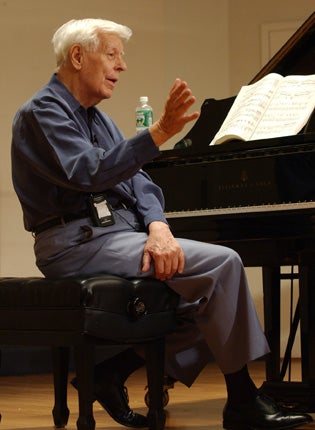Earl Wild: Virtuoso pianist whose work sparked a revival of interest in Liszt

The reputation of the pianist Earl Wild, who has died aged 94, suffered to some degree from the ways he used his prodigious talent. Wild saw himself firmly in the tradition of Franz Liszt, from whom he enjoyed only two degrees of separation. He not only favoured the Romantic repertoire over the modern, but followed Liszt's example in his own piano transcriptions of well-known orchestral work, flashy pieces by crowd-pleasing composers like Rachmaninoff, opera, and popular songs. These showcased his powerful technique and strong tone with a flamboyant bravura that contrived to make the difficult appear easy, and often made subtle changes to show off his virtuosity.
That virtuosity may be said to have sparked a revival of interest in Liszt, and he also prompted a re-evaluation of Gershwin's importance. But it was Wild's misfortune to be the greatest American pianist in an era when even Americans automatically gave more respect to European artists. Still, in 1982, Wild played a programme of transcriptions at New York's Carnegie Hall. The same night, the Metropolitan Opera House hosted Vladimir Horowitz, who is said to have told his agent, "I'm worried about my audience. Earl Wild is very good."
Wild showed his talent early. Growing up in Pittsburgh, he had perfect pitch, and even at the age of three could copy on piano operas he had heard on records. By the age of 12 he was studying with Selmar Jansen, whose teachers had been pupils of Liszt; his later teachers included students of Paderewski, Busoni, and Ravel. At 14 he was playing glockenspiel and celesta in the Pittsburgh Symphony; the following year he performed Liszt's Piano Concerto No 1 with the Minneapolis Symphony under Dimitri Mitropoulos. He went to university at Carnegie Tech, where he played flute and cello in the orchestra, while also studying bass as well as piano.
At 22 he went to New York as staff pianist for the NBC radio network, and in 1939 performed what is believed to be the first televised piano recital. Three years later, he became famous across America for his rendition of George Gershwin's Rhapsody In Blue in a radio concert with the NBC Orchestra under Arturo Toscanini. He toured, performing the Rhapsody and Gershwin's Piano Concerto, and returned frequently to the American composer, creating works like his Grand Fantasy On Airs from Porgy and Bess, or Seven Virtuoso Etudes On Popular Songs.
During the Second World War Wild played flute in the US Navy band while giving recitals at the White House and accompanying Eleanor Roosevelt on tour selling war bonds; he would play "The Star Spangled Banner" before each speech by the First Lady. After the War, when the ABC television network was created, Wild joined as staff pianist and conductor. At ABC he wrote his biggest work, the Easter oratorio Revelations (1962), but his work for the network also included parodying opera tunes for the comedian Sid Caesar. In 1949 he performed the world premiere of Paul Creston's excellent Piano Concerto.
Wild left ABC in 1968 to concentrate on concerts and recordings. He made some 57 records, but not until 1997 did his The Romantic Master, a recital featuring Mozart, Chopin, Handel, and Saint-Saens, win a Grammy. That year he started his label Ivory Classics, which reissued older recordings and new work. Always full of energy, Wild showed no signs of slowing down as he passed retirement age. In 1992 he debuted his Doo-Dah Variation, based on songs by Stephen Foster, a typically playful yet bravura piece. In 2003 his Sonata 2000 was premiered by Bradley Bolen. Wild gave his last Carnegie Hall concert on his 90th birthday in 2005, the same year his last record, Living History, was released. His final public performance came in 2007 at Los Angeles' Disney Hall, when he was presented with the presidential medal of the Academy of Recording Arts and Sciences.
Dedicated to passing on knowledge as it had been passed on to him, Wild taught countless master classes at many universities, including his alma mater, now called Carnegie-Mellon, and the Eastman and Juilliard Schools. He was still giving classes a week before he died, in Palm Springs of congestive heart disease. He is survived by his partner of 38 years, Michael Rolland Davis. His memoirs will be published later this year by Carnegie-Mellon Press.
Michael Carlson
Earl Wild, pianist: born Pittsburgh, Pennsylvania 26 November 1915; partner to Michael Rolland Davis; died Palm Springs, California 23 January 2010.
Subscribe to Independent Premium to bookmark this article
Want to bookmark your favourite articles and stories to read or reference later? Start your Independent Premium subscription today.

Join our commenting forum
Join thought-provoking conversations, follow other Independent readers and see their replies